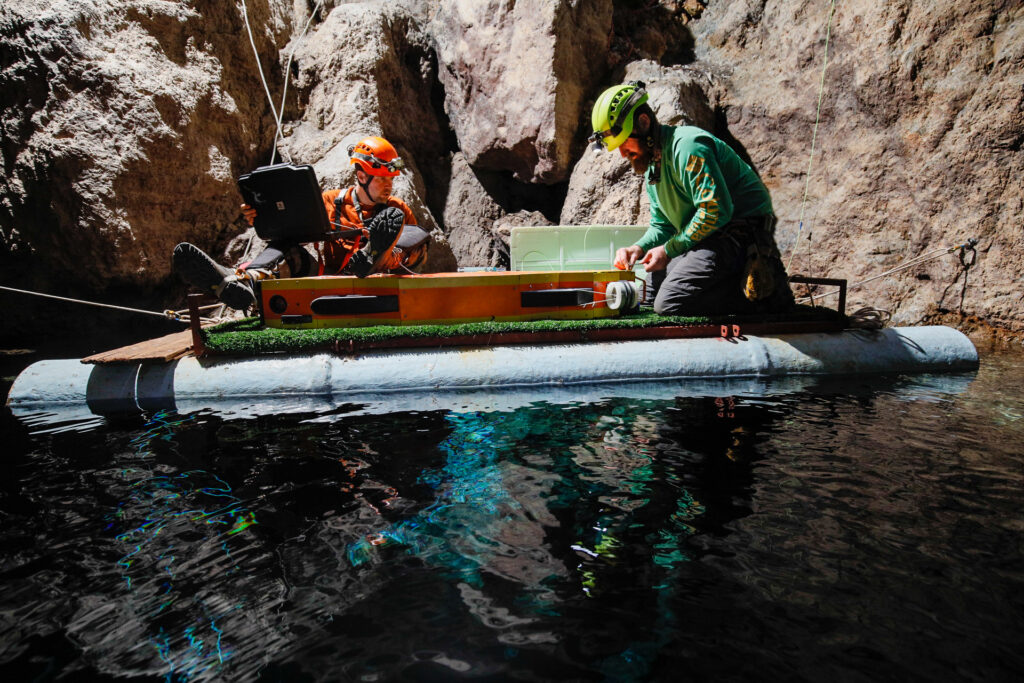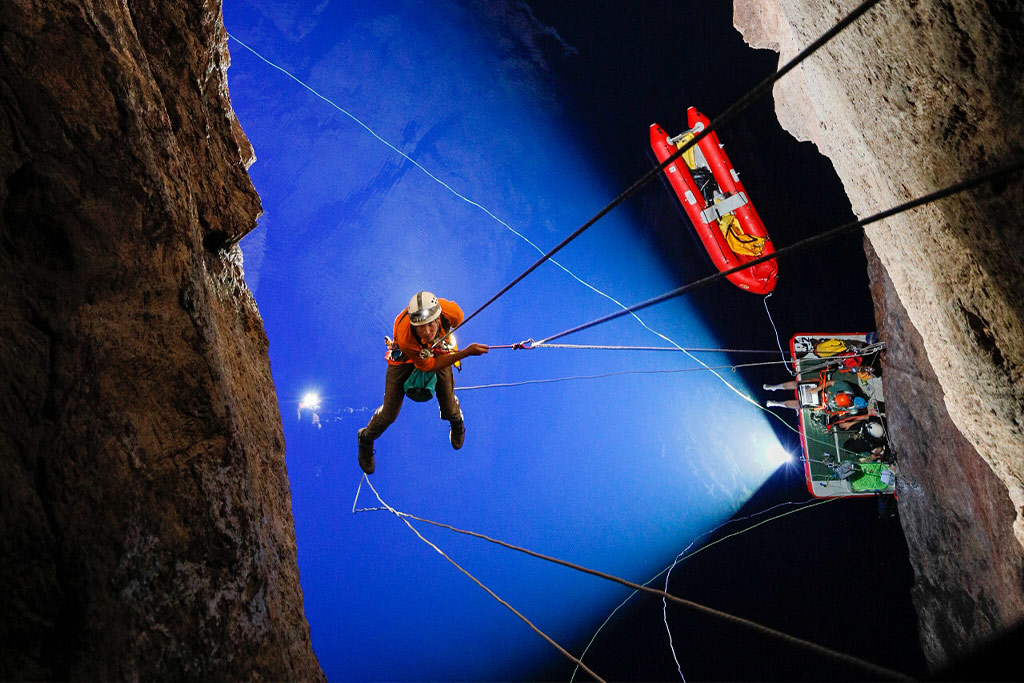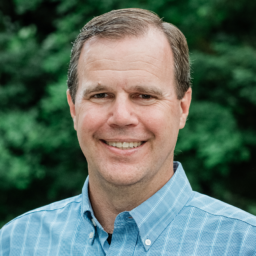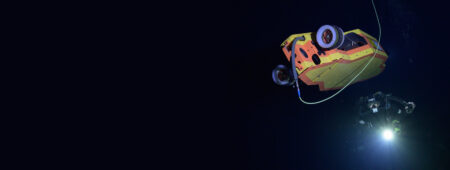
Pursuing ‘the Next Cool Thing’ Leads to Breakthroughs in Robotics and Healthcare
Whether navigating a robot to the unexplored bottom of a subterranean lake, developing the electromechanics to perform surgery inside a colon, or trying to cram a fully automated water-treatment system into a semi trailer, 2001 Hertz Fellow Neal Tanner pursues projects that meet two criteria: complex systems to be controlled and the promise of fun.
“I’ve never been very strategic about my career path,” Tanner said. “I’ve always just been kind of like, ‘Oh, that looks like fun, I’ll do that.’ And then something else comes along that looks like fun, and I’ll do that. I’m probably less successful in any one area for not having focused. At the same time, it’s what I enjoy doing.”
Support from the Hertz Foundation allowed Tanner to pursue an unconventional path from the start. After receiving a B.S. in mechanical engineering from the University of Texas at Austin, Tanner began work on his Ph.D. in control systems and robotics at Stanford.
“I selected a lab with a brand-new professor, which is always a bit of a scary thing,” he said. “But he was brilliant, and I learned a tremendous amount from him. In the end, he didn’t get tenure and there was very little funding available. I don’t know if I would have had the guts to sign on with a new professor without the Hertz Fellowship. And certainly, my experience would’ve been very different as the lab struggled with funding.”
After receiving his degree, Tanner was an engineering fellow with Bay Area startup Hansen Medical, where he focused on flexible robotic manipulators and helped commercialize telerobotic catheter systems for cardiovascular applications. After a decade in Silicon Valley, he and his wife, water reuse expert Eva Steinle-Darling, moved to Tanner’s hometown of Austin, Texas. After two years with Omni Water Solutions, where he worked on recycling water used in oil and gas exploration, including an attempt to treat frack water on site with a water system contained in a semi trailer, he became an independent consultant with tntAnalysis in 2014. Family was a major influence in his decision.
“We came back to Texas because we were starting to raise a family and wanted a different quality and style of life than California and to be closer to grandparents. But there aren’t the same job opportunities once you leave Silicon Valley,” Tanner said. “I still work with a lot of companies in the Bay Area, but working remotely changes the types of things I can do. I’ve drifted more toward software development than control system work because it’s easier to do from a distance.”
The switch hasn’t diminished the opportunity for fun, however. In the past decade, Tanner has worked on underwater and ice-penetrating robots with Stone Aerospace and Sunfish Inc., including a 2019 expedition to Dragon’s Breath, a cave in Namibia that contains the world’s largest non-subglacial underground lake, with a depth beyond the range of human divers. New to caving, Tanner trained for the trip so he could fully participate.
“The team that went to Namibia was a mix of experienced cavers and roboticists. The altruistic version of the story is I saw that we needed someone cross-trained to make the team operate more efficiently. The truth of the matter is that I didn’t want to go all the way to Namibia and stand at the top looking at a cave and never get to go in it,” Tanner said, laughing.
As unexpected debugging issues arose, his cross-training ended up being essential to the expedition’s success—and made for a memorable trip. Every morning at Dragon’s Breath, Tanner rappelled, laptop in tow, down a narrow crevasse that opened to a cavernous lake, then dropped to a raft on the crystal-clear water, where he would control the robot. “It was one of the most fun things I’ve done career-wise,” he said.
Stone Aerospace and Sunfish continue to develop robots to ultimately explore the frozen lakes of icy outer moons like Europa, but Tanner has moved on. “I can’t stay focused on one thing. I’m always getting distracted with the next cool thing to do,” he said.
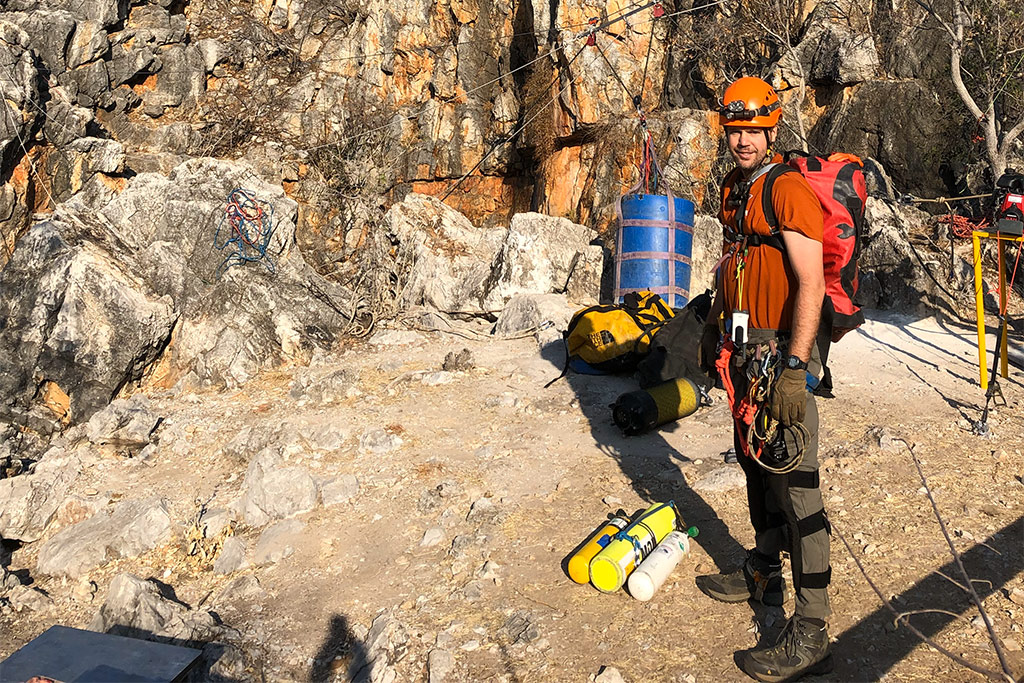
“The next cool thing” is actually two cool things, with two different start-ups: a robotic colonoscope for performing surgery from the inside of the colon, and a robotically deployed replacement of the heart’s mitral valve.
The colonoscope, Tanner explained, provides a level of control that allows for nuanced surgery from inside the colon, ideally reducing the need to remove sections of the colon in cases of cancer, for example.
The mitral valve project is focused on replacing the most difficult heart valve to reach in a more deliberate manner than previously achieved, through a minimally invasive procedure. “Part of the problem wasn’t the valve itself, but the ability to deploy it and place it accurately,” Tanner said. The valve is packed into a tube to enable traveling through the femoral vein. “When you pull that tube off, the valve springs open and you hope it lands in the right place,” he said. “By robotically controlling the process, we’ve got a valve that can be opened in a controlled fashion and precisely placed.”
Tanner’s enjoyment in taking on new challenges extends to the Hertz Foundation. Rather than move from one project to the next, though, he has added to his responsibilities. Tanner started out as a reviewer for the Hertz Thesis Prize in 2018. Since 2020, he has served on the Fellowship and Programs Council and as a member of its Executive Committee, as well as chair of the Prize Committee and of the Hertz Thesis Prize subcommittee. In 2022, he became a Hertz Community Representative for the Austin area. He has also been a consistent donor for over a decade.
For Tanner, engaging in new opportunities is a way of staying true to himself.
“Part of my philosophy is you have to figure out what you want,” he said. “If you want the classic definition of success, it’s probably good advice to pick one thing and be really, really focused on it. That’s just never been me. For better or for worse, I’ve taken this path of chasing every opportunity—and I’ve had a lot of fun doing it.”
